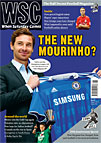 The big teams in South America are facing a serious challenge and there could be more to come. Sam Kelly explains
The big teams in South America are facing a serious challenge and there could be more to come. Sam Kelly explains
When the trophy was presented after the final of the 2011 Copa América on Sunday July 24, it was to a burst of sky-blue-and-white confetti. That much was not unexpected. Argentina were, after all, the pre-tournament favourites as well as the hosts. But, at the end of a momentous competition full of upsets, they weren’t the victors. The colours were instead being blasted skyward to celebrate the victory of the hosts’ neighbours and rivals from across the Río de la Plata, Uruguay.
Looking back over the history of the tournament, Uruguay’s win isn’t a triumph for the little men. It is difficult to paint it as such when it took them one clear of Argentina on to a record 15 Copas. But the fact remains that 18 months ago, when they had just barely scraped qualification for the 2010 World Cup, few would have had Óscar Washington Tabárez’s men down as potential winners of that tournament (or, of course, semi-finalists in South Africa).
The story of this year’s Copa has not been one of thrilling matches, even if a good number of them were more interesting than the scorelines suggest. It has, though, been one of unexpected results. The third favourites won it, which is not that far out (although the gap in the odds on betting markets between Uruguay and second favourites and holders Brazil was huge), but they beat Paraguay in the final. And a glance at the teams who played in the third-place play-off the previous day confirms the picture of a tournament in which the continent’s old order has been emphatically overturned.
That match was a 4-1 win for Peru over a Venezuela side who, in reaching the semi-finals, had won two matches – that’s two more than Paraguay, the team who edged them (and Brazil) out via penalty shootouts. Both Peru and Venezuela have come an awfully long way in a very short time. Just before the previous Copa América, which they hosted in 2007, Venezuela were still widely referred to as the continent’s whipping boys, and it was difficult to see where improvement was coming from.
They reached the quarter-finals of their own Copa, and months later appointed César Farías as manager. Farías has also taken charge of the youth sides for some games, and his knowledge of the whole national set-up has been a big plus for them.
Peru have, unlike Venezuela, had some great moments in their past, but were coming to this Copa from an even lower point. They finished rock bottom of the South American qualifying group for the 2010 World Cup, with only three wins. Even those who had a feeling this Copa was going to be one for the underdogs never dreamed Peru would go far.
Their experienced Uruguayan manager Sergio Markarián – who managed Tabárez when the latter was a player at Bella Vista – provided perhaps the off-pitch moment of the tournament when he let rip in a press conference after a question about why his side were so defensive. “It’s easy to say ‘Oh, we’re very attack-minded’ when you’ve got the kind of players they [Chile]have,” he said, before exclaiming: “The day has to be close when we [the ‘smaller’ nations] expect more even standards of refereeing.” Peru did open up when they had the chance, and striker Paolo Guerrero actually ended up as the tournament’s top scorer courtesy of his hat-trick in the third-place play-off. Tabárez was undoubtedly the best manager of the Copa, but Markarián has surely been the most influential in the long term.
If this really is the end of the old order, what lies ahead for Brazil and Argentina? At the time of writing the latter have just parted company with manager Sergio Batista and Alejandro Sabella, the former Sheffield United and Leeds midfielder, looks the most likely replacement. As someone who has actually worked as a coach and manager before, he would be an improvement on Argentina’s last two bosses, Batista and Diego Maradona.
Brazil’s situation is trickier to read. They were always treating the Copa more as a chance to build for the future, and Mano Menezes is highly unlikely to lose his job as a result of the quarter-final exit to Paraguay. All the same, having no competitive matches (discounting the Confederations Cup) between now and the World Cup they will host in 2014 will be a problem for the development of a young team.
It could mean there are yet more chances for the previously smaller nations to improve further and close the gap to the more traditional powerhouses. And with the next World Cup final to be held in the Maracanã, scene of their greatest triumph in 1950, new South American champions Uruguay might be forgiven for hoping they will be riding the wave of that momentum.
From WSC 295 September 2011
 Simon Menary discusses the future of Supporters Direct in the wake of unfortunate publicity and threats to their funding
Simon Menary discusses the future of Supporters Direct in the wake of unfortunate publicity and threats to their funding
